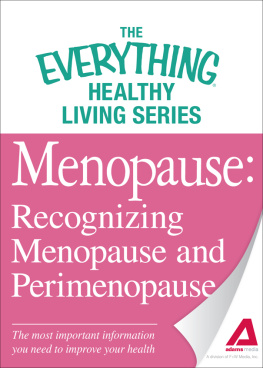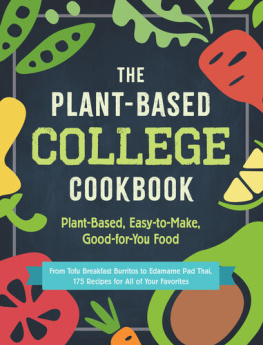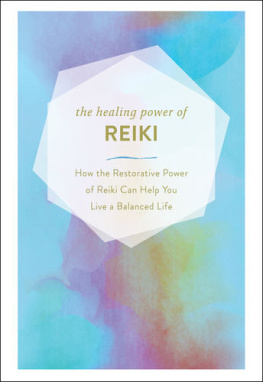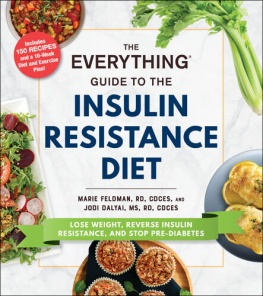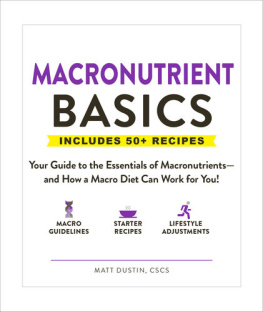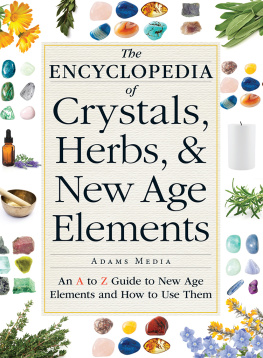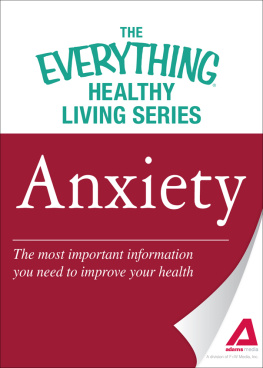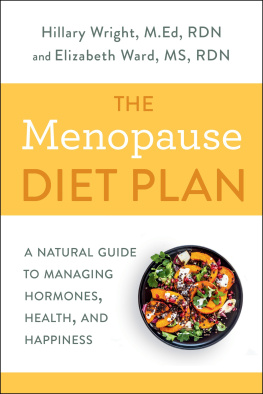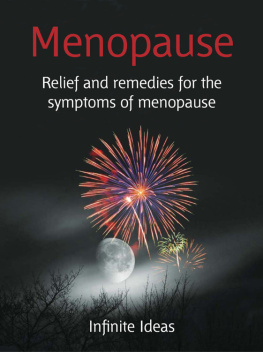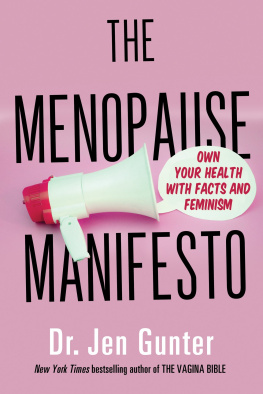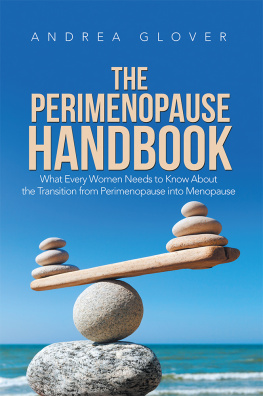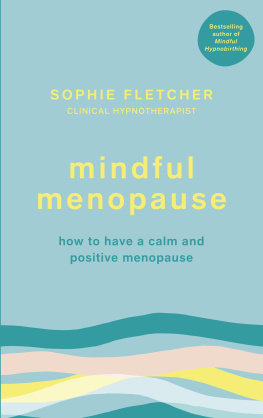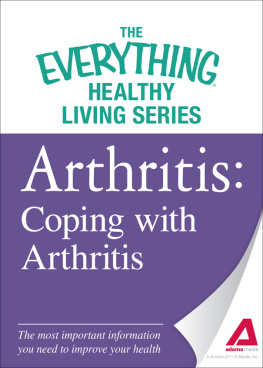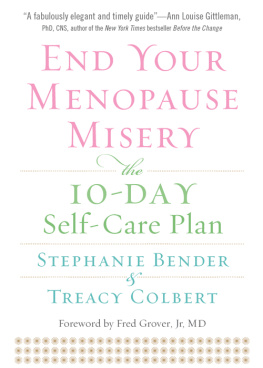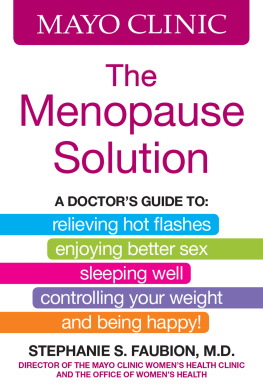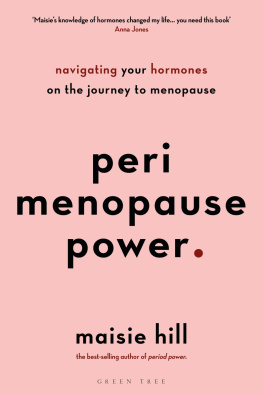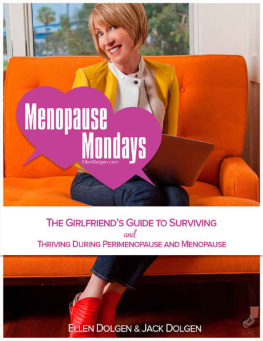The Everything Healthy Living Series
Menopause: Recognizing Menopause and Perimenopause
The most important information you need to improve your health
Adams Media, an imprint of Simon & Schuster, Inc.
Avon, Massachusetts
Contents
Introduction
For more than 10 years, millions of readers have trusted the bestselling Everything series for expert advice and important information on health topics ranging from pregnancy and postpartum care to heart health, anxiety, and diabetes. Packed with the most recent, up-to-date data, Everything health guides help you get the right diagnosis, choose the best doctor, and find the treatment options that work for you.
The Everything Healthy Living Series books are concise guides, focusing on only the essential information you need. Whether youre looking for an overview of traditional and alternative migraine treatments, advice on starting a heart-healthy lifestyle, or suggestions for finding the right medical team, theres an Everything Healthy Living book for you.
Menopause
Despite its reputation, menopause is more than just some annoying phase that women go through. Like puberty, it is a physical marker that ushers you into a new stage of your life, and (like puberty) it requires time and information to understand all the changes. If you are a woman experiencing the hormone swings and changes that accompany menopause, then the more you know about whats coming, the better you will be able to take charge of your transition.
Although the basics of healthy menopause boil down to the basics of all healthy lifestyles exercise, diet, sleep, and state of mind this book explores them as they relate to your journey through that last reproductive hurdle. It offers you choices for improving your health and well being, and ideas for making menopause the beginning of an exciting and enriching time. You have a continuing opportunity for improving your life, and menopause is the perfect excuse to take stock and make the changes youve been meaning to make for years.
The baby boomers have had an enormous impact on American life in their every stage of development. As children they required more and better schools; as young adults they redefined sexual expectations and intimacy; as a workforce they have changed the landscape of work environment; and it only stands to reason that they will change our collective outlook on getting older. With so many women approaching menopause, there will be more attention to this important stage of life, and there is already more research and information than ever before on womens health over the lifespan. If you are approaching menopause or in the midst of it, you are in a lot of good company.
Above all, you need support and knowledge. You need information that teaches you about menopause and that helps you make the right choices for you. Keeping your perspective during a time of hormone shifts and life changes is no small matter. And keeping your health as you move through menopause and beyond will make the transition not a dreaded ordeal, but rather the open door to the rest of your life.
If youd like to learn more about menopause, check out the print version of The Everything Health Guide to Menopause, 2nd Edition, available in print (978-1-59869-405-5).
Menopause, Me? Accepting the Inevitable
Menopause is a topic some women would rather ignore than explore. Many younger women see it as irrelevant, but as they approach the age of menopause they look around for reassurance that it is not only survivable, but something to look forward to. The bad press may leave you worried or confused, but before you deny it, despair at it or try to dodge it, lets take a look at what menopause really is.
The Facts: What Is Menopause Anyway?
The simple answer is this: Menopause is when your period finally stops. But because your periods may become less regular and occur at greater intervals as you approach menopause, you dont know youve gone through menopause until twelve months have passed since your last period.
Count the Months
According to the Council of Affiliated Menopause Societies (CAMS), menopause is The permanent end of menstruation. Menopause is not a disease but a natural event in a womans life that results from a decrease in the ovarian production of sex hormones estrogen, progesterone, and testosterone. Menopause is confirmed when a woman has not had a menstrual period for twelve consecutive months. By the time you know youve experienced natural menopause, youre already saying, So that was menopause?
How Menopause Affects You
Menopause doesnt make a grand entrance no fanfare, no fireworks. Menopause becomes a reality for most women through a series of physical, mental, and emotional changes some subtle, some more dramatic that tend to emerge, evolve, intensify, and fade over a period of weeks, months, and years. What most women refer to as menopause, with symptoms such as hot flashes, memory problems, and mood swings, is actually the period leading up to menopause, called perimenopause. The changes are unique to each individual, so women dont have a single menopause profile to compare themselves to. Menopause can have many faces, and theres no one best way to prepare for or experience it. And its not as bad as you may think!
Alert
To avoid unnecessary worry and discomfort about menopause, dont deny the obvious. Learn all you can about whats happening to your body, and then take the necessary next steps to begin making your passage through menopause as painless and productive as you possibly can. Youve made a great start by picking up this book!
When Will It Happen?
Predicting when you will go through your menopause is definitely not an exact science. According to the North American Menopause Society (NAMS), the average age of natural menopause in the Western world is fifty-one. This of course is only an average, and women may experience menopause when they are as young as thirty, or well into their sixties. The good news about menopause is that the end of childbearing can mean the beginning of other sorts of productivity. With more leisure time, older, independent children, and a perspective broadened by experience, women can begin to engage in satisfying activities that they have either abandoned with the onset of responsibilities, or never been able to explore. Since most American women born after 1950 can expect to live until their mid-eighties, the majority of menopausal women in the United States today have one-half to one-third of their lives to live after theyve gone through menopause. Many factors determine your age at menopause, including which type of menopause you experience.
Natural Menopause
As its name implies, natural menopause refers to the natural process of ceasing to menstruate. It occurs as your ovaries stop producing hormones, and usually occurs between the ages of forty-eight and fifty-five, with the average at about fifty-one and a half years.
Induced Menopause
Induced menopause occurs when a woman has her ovaries surgically removed (with or without a total hysterectomy) or when ovaries stop functioning as a result of chemotherapy, radiation, drug therapy, or other medical treatments. Because induced menopause is the result of unexpected physical conditions or deliberate health decisions such as surgery or chemotherapy, it can happen at any age.

